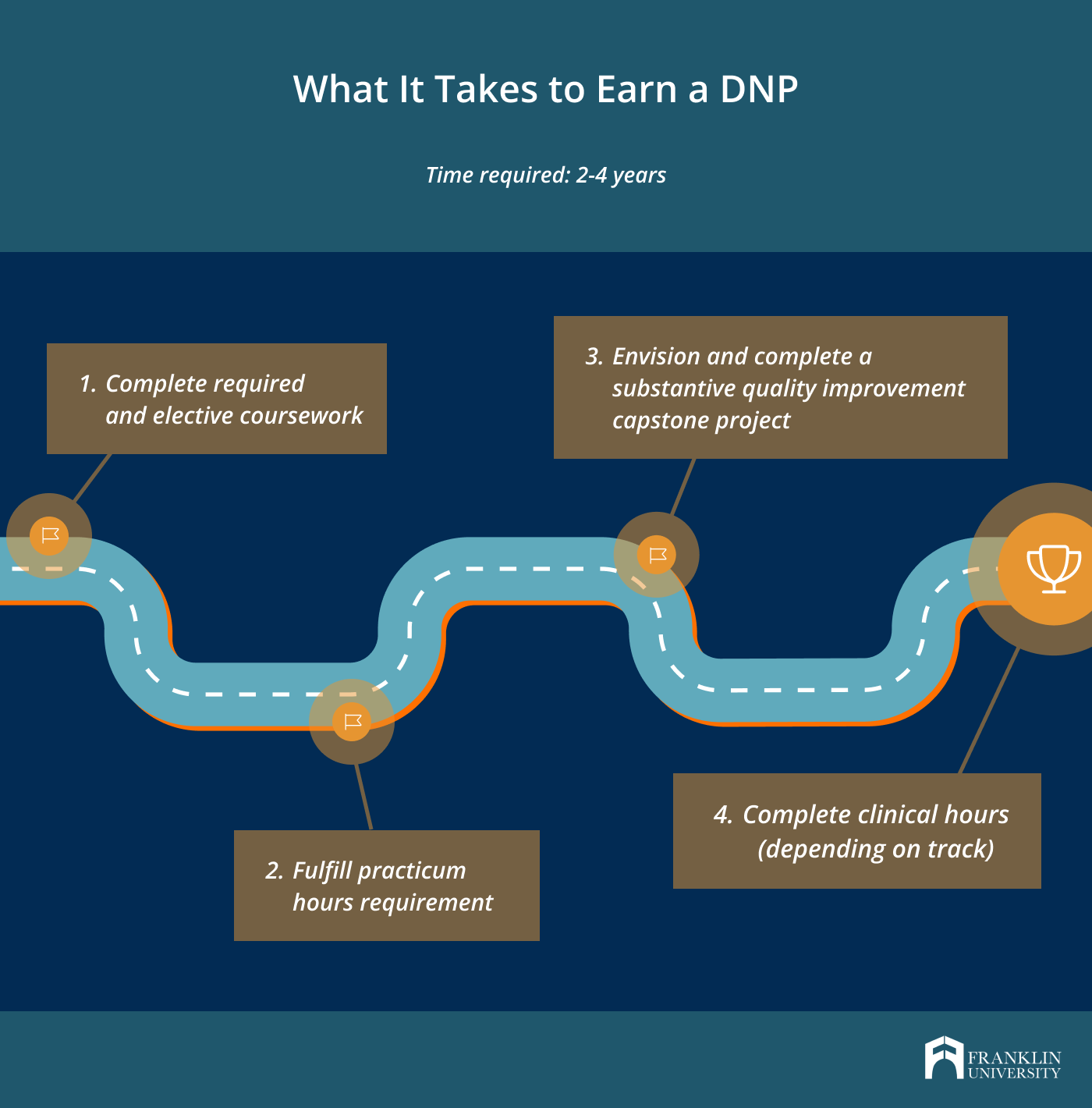Request Information
We're Sorry
There was an unexpected error with the form (your web browser was unable to retrieve some required data from our servers). This kind of error may occur if you have temporarily lost your internet connection. If you're able to verify that your internet connection is stable and the error persists, the Franklin University Help Desk is available to assist you at helpdesk@franklin.edu, 614.947.6682 (local), or 1.866.435.7006 (toll free).
Just a moment while we process your submission.

What Are the Requirements for a Doctor of Nursing Practice (DNP)?
If you’re thinking about how you can take your nursing career to the next level, you might be considering a Doctor of Nursing Practice (DNP) degree.
Earning a DNP is a great way to grow your capabilities and qualify for new and rewarding roles. But what does it take to get into and graduate from a DNP program?
Who Is a DNP For?
A DNP is a doctoral degree primarily intended for licensed nurses at any stage in their careers who wish to move into advanced practice or nursing leadership positions.
While most advanced practice nursing specialties do not yet require a doctoral degree, leading nursing organizations, including the American Association of Nursing Colleges (AACN), have recommended that the DNP degree become the educational standard for advanced practice roles by 2025.
DNP degrees are also a good match for future nursing and healthcare leaders since they focus heavily on implementing evidence-based practices to achieve systemic quality improvement and drive better patient outcomes.

Get a FREE guide to help you advance your career, featuring helpful advice and thoughtful insights from nursing experts.
What Are the Admission Requirements for a DNP?
DNP admissions requirements vary by school and enrollment pathway. There are three primary paths to a DNP program for students with different backgrounds.
MSN to DNP
If you are a registered nurse with a license in good standing and you already hold a Master of Science in Nursing (MSN), you can enter a DNP program without prerequisite coursework (assuming you meet the other admissions criteria). According to the AACN, nearly 400 U.S. schools currently offer MSN to DNP programs.
BSN to DNP
If you hold active RN licensure and a BSN degree but you either don’t have a MSN or have an unrelated master’s, you might choose to pursue a BSN to DNP program.
These admission pathways include prerequisite coursework to deliver the critical learnings of an MSN program before progressing to the DNP curriculum. However, these prerequisites are usually significantly more limited than the work (and expense) that would be required if you chose to complete an MSN before your DNP. For example, Franklin University’s BSN to DNP pathway requires two prerequisite courses which take eight months to complete, compared to the two years that a typical MSN requires.
There are currently nearly 300 BSN to DNP programs in the United States.
Pre-licensure Programs
If you don’t have a nursing license or a BSN, you may choose to earn nursing licensure before pursuing an advanced degree. However, if you know that a DNP is your ultimate goal and you hold a bachelor’s degree in a different field, you can pursue the least common pathway to the DNP, a pre-licensure or direct entry program. Less than 20 U.S. schools currently offer this option. Since direct entry programs require extensive prerequisite courses, they are typically longer and more expensive than other DNP pathways.
Other Requirements
Besides prior education and nursing licensure, some schools require additional application materials such as GRE scores, letters of recommendation and a minimum undergraduate GPA. You will likely also need to pass a background check for your clinical placements.
What Do You Learn in a DNP Program?
If you pursue a DNP degree, you’ll learn how to critically assess and apply the latest research to improve quality of care, patient safety, health outcomes and organizational policies. You’ll also learn to lead healthcare delivery teams and make ethical, evidence-based decisions using the latest tools and technology.
Depending on your chosen focus, you’ll either take electives in areas like the business of healthcare, the social determinants of health or organizational leadership or complete advanced nursing coursework to prepare for licensure in a particular specialty. For example, a student in a DNP nurse practitioner program student might take courses in advanced pharmacology and pathophysiology. No matter what program you choose, you’ll learn to apply your learnings through hands-on practicums (and clinical hours if you choose a clinical specialty).
What Are the Graduation Requirements for a DNP?
While each school sets its own graduation requirements, which can vary further by track, certain expectations remain fairly consistent. To graduate, you’ll need to:
1. Complete all required credit hours and core courses.
The number of credits required will depend on your school, specialty and the level at which you entered the program. For example, if you are enrolled as a BSN to DNP student, you will need to complete more credits than a DNP student who already holds an MSN.
2. Complete required practicum hours and a scholarly project.
DNP programs typically require students to spend a certain number of hours applying the theory that they learn in the classroom to real-world problems (while receiving feedback). These practicum hours culminate in the DNP scholarly project, which asks students to identify a quality improvement opportunity at their organization and develop and implement a plan to achieve better outcomes.
3. Complete required clinical hours if applicable.
DNP programs with a clinical focus also require students to complete a specified amount of clinical hours in their specialty. For example, students in Franklin University’s Psychiatric Mental Health Nurse Practitioner DNP program complete 600 clinical hours in that specialty at a medical office or clinic.

How Long Does a DNP Take?
The time it takes to complete your DNP will depend on your prior education and experience and the program and track you select.
If you already hold an MSN and you’re pursuing a leadership-focused DNP, you may be able to graduate in as little as two years since the program doesn’t require clinical hours. If you are pursuing a BSN to DNP degree with an advanced practice track, on the other hand, it might take four years to complete your DNP. It’s important to note that many qualified nurses who pursue a DNP work while they study, an option that is even more attainable with flexible online programs. You may even be able to complete your clinical hours at your normal place of employment.
If you do not have a nursing background but do hold a bachelor’s degree in another subject and choose a direct-entry DNP program, you can expect a minimum of four years of full-time coursework.
Find Your Path Forward in Nursing
If you’ve decided that earning DNP is the best way to achieve your personal and professional goals, consider Franklin University’s flexible degree options for busy RNs. You can prepare for executive positions through the leadership track or pursue advanced practice licensure with tracks focused on adult-gerontology primary care, family practice and psychiatric and mental health.
With two start dates a year, a flexible online format and practicum and scholarly project opportunities embedded within classes, Franklin is here to help you achieve your professional dreams.
Learn more about Franklin’s DNP programs.





